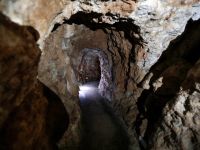Syria has completed a pullout of its troops from Beirut and surrounding areas, Lebanese officials were quoted as saying on Tuesday.
Beirut and nearby mountains were virtually empty on Tuesday of the Syrian troops who for years have been part of the city's scene.
“The massive military pullout from Greater Beirut has been completed,' a Lebanese official told Reuters.
He said some 'strategic and sensitive' positions remained guarded by Syrian soldiers, waiting to be handed over to the Lebanese Army.
Greater Beirut includes the capital and surrounding towns.
The report contradicts a US account that the withdrawal is “incomplete.”
The US said Monday it would closely follow the withdrawal, an action it said appeared to have stalled, reported AFP.
"At this point, we're watching the situation closely," State Department spokesman Richard Boucher said. "We've seen ongoing but incomplete redeployments."
"These are matters for the Lebanese and the Syrian authorities to decide and coordinate on," he said, noting that the 1989 Taef accords that ended Lebanon's 15-year civil war called for a troop withdrawal as early as 1992.
Last week, Syria began the redeployment of troops that had first moved into Lebanon a year after the civil war began in 1975, although the withdrawal appeared to stall Sunday after nine positions in Beirut were evacuated.
On Monday, Syrian troops remained in at least 15 positions in the capital.
Neither the Lebanese nor Syrian governments have commented on the scope of the redeployment, announced June 14 in a Lebanese army statement.
The army said the withdrawal would last for several days.
The scaling back of Syrian troops followed stepped-up calls this year, mostly by Christian Lebanese, for Syria's estimated 27,000 troops to be withdrawn following the end of Israel's 22-year occupation of southern Lebanon in May 2000.
Within the same context, the Daily Star newspaper reported that the dismantling of Syria’s intimidating military presence in Beirut and other strategically sensitive spots in Mount Lebanon offered a rare opportunity to reverse the plummeting popularity of the present administration and ease political tensions gripping the country.
President Emile Lahoud had partially regained the initiative since April, when he initiated dialogue with some of his critics, beginning with Maronite leader Nasrallah Butros Sfeir and culminating in the landmark meeting with Druze leader Walid Jumblatt last week.
The redeployment of the Syrian forces, however, provided a much-needed push for the confidence-building drive that has been marred by maneuvers to upstage the president and diminish the clout of his mandate, the paper said.
The high-profile Syrian redeployment, touted as a result of coordination between Lahoud and Syrian President Bashar Assad, was a welcome political coup.
Although the shrinking size of the Syrian army in Lebanon does not necessarily mean less political influence, it has stripped many of Lahoud’s opponents of a powerful weapon, it said.
But the positive impact of the Syrian move could rapidly fade if not coupled with other steps to restore to the presidential post its traditional image as both head of state and head of the Christian community – Albawaba.com
© 2001 Al Bawaba (www.albawaba.com)







